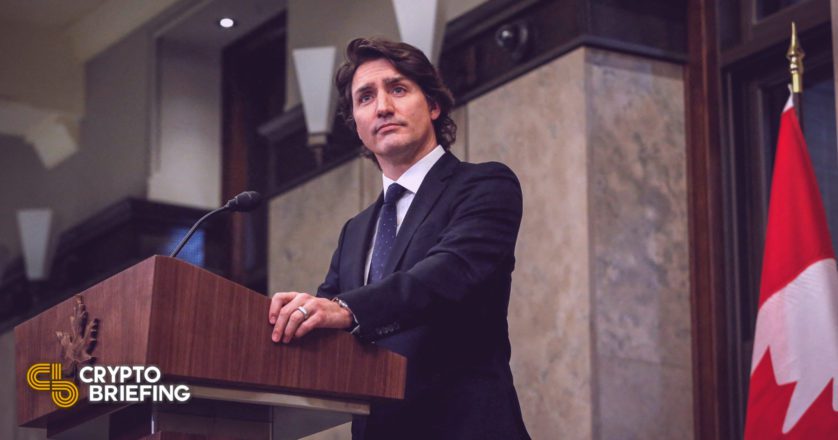Trudeau Says He'll Freeze Bank Accounts; Crypto Fans Point to Bitcoin
Canada’s Prime Minister Justin Trudeau has invoked the Emergencies Act and threatened to bar truckers protesting vaccine mandates from the traditional financial system. In response, the crypto community has slammed the government's moves.

Key Takeaways
- Canada's Prime Minister Justin Trudeau invoked the Emergencies Act to curtail anti-vaccine mandate protests.
- Under the act, the government can censor payments and freeze citizens' bank accounts without going through the court system.
- Many members of the crypto community scorned the government's power move, arguing for increased cryptocurrency adoption.
Share this article
In response to the trucker-led protests over vaccine mandates, the Canadian government has for the first time invoked the 1988 Emergencies Act, meaning it can freeze or suspend citizens’ bank accounts without a court order or due process. Cryptocurrency enthusiasts responded by advocating for self-sovereign money and digital assets like Bitcoin.
Canada Situation Highlights Crypto’s Value Proposition
Crypto fans are slamming Justin Trudeau over his handling of the ongoing COVID-19 protests across Canada.
The Canadian Prime Minister escalated the tensions Monday when he invoked the Emergencies Act for the first time in a bid to curtail nationwide protests over COVID-19 restrictions. Under the act, the government can use the military against “illegal” protests and freeze the bank accounts of anyone directly or indirectly involved without going through the court system.
In a Monday press conference, Canada’s Deputy Prime Minister and Minister of Finance Chrystia Freeland outlined the measures, said:
“As of today, a bank or other financial service provider will be able to immediately freeze or suspend an account without a court order. In doing so, they will be protected against civil liability for actions taken in good faith.”
Trudeau’s government has faced pressure in recent weeks amid protests over the country’s vaccine mandates. After vaccine requirements were introduced for truckers crossing the U.S. border, protestors gathered to form a blockade at the border bridge. The protestors used vehicles and human chains to prevent traffic from passing in what was dubbed the “Freedom Convoy.” The border blockade caused supply chain issues and sparked wider protests across Canada over COVID-19 restrictions.
As the protests gained traction, protestors raised over $10 million through a GoFundMe fundraising campaign. However, under pressure from the government, the company refused to distribute the funds citing “unlawful activity,” and instead returned it to the donors.
Discussing the implications of the Emergencies Act, Freeland said that the country would be extending the scope of its anti-money laundering and anti-terrorist financial regulations. She said:
“We are broadening the scope of Canada’s anti-money laundering and anti-terrorist financial rules so they cover crowdfunding platforms and the payment providers they use. These changes cover all forms of transactions, including digital assets such as cryptocurrencies.”
The Canadian government has now obligated crowdfunding platforms and payment providers to report all suspicious transactions—specifically donations to the anti-vaccine mandate protesters—with the relevant authorities. It means that these protestors are now categorized the same way as “terrorists” and any donations supporting them constitute the same as “terrorist financing.”
Crypto Community Slams Emergencies Act
In response to the GoFundMe ban, protestors turned to alternative funding methods. They raised more than 20 Bitcoin worth roughly $900,000 in a few days. Consequently, the Canadian government has stepped in to broaden the scope of the financial surveillance laws to include Bitcoin payments.
However, blocking Bitcoin payments is easier said than done. As Bitcoin transactions are peer-to-peer, they’re impossible to censor, freeze, or seize if used accordingly. In fact, the concept of “censorship resistance” is one of Bitcoin’s core value propositions and the reason it was created. It allows people to have an alternative way of transacting free from the control of governments and banks.
Once Trudeau invoked the Emergencies Act, the crypto community was quick to point out Bitcoin’s decentralized characteristics. Coin Center’s Head of Communications Neeraj Agrawal sarcastically tweeted: “oh no please don’t expose how easily the state can lean on financial intermediaries cut off political protest fundraising.”
Sharing a video clip of Freeland announcing that banks would be able to freeze protestors’ accounts on Twitter, Coinbase CEO Brian Armstrong also weighed in. He wrote:
“Concerning to see stuff like this happening in any country, especially such an economically free place like Canada. Self-custodial wallets are important!”
Are these the people who like to give lessons to other countries about democracy and freedom?
This is one of the top ranking countries in the “democracy index”?
Your credibility on these topics is now worth 0.pic.twitter.com/wCjh9bXwDt
— Nayib Bukele (@nayibbukele) February 15, 2022
El Salvador President Nayib Bukele, who last year pushed through a law to make Bitcoin legal tender, also fired shots against the Canadian government, questioning “people who like to give lessons to other countries about democracy and freedom.” Reposting the viral clip of Freeland discussing the Emergencies Act, he added that “[Canada’s] credibility on these topics is now worth 0.”
Many other high-profile Bitcoin and crypto enthusiasts criticized Trudeau and the Canadian government, remarking that such government actions highlight the importance of decentralization, censorship resistance, and self-sovereign money.
Disclosure: At the time of writing, the author of this feature owned ETH and several other cryptocurrencies.
Share this article
